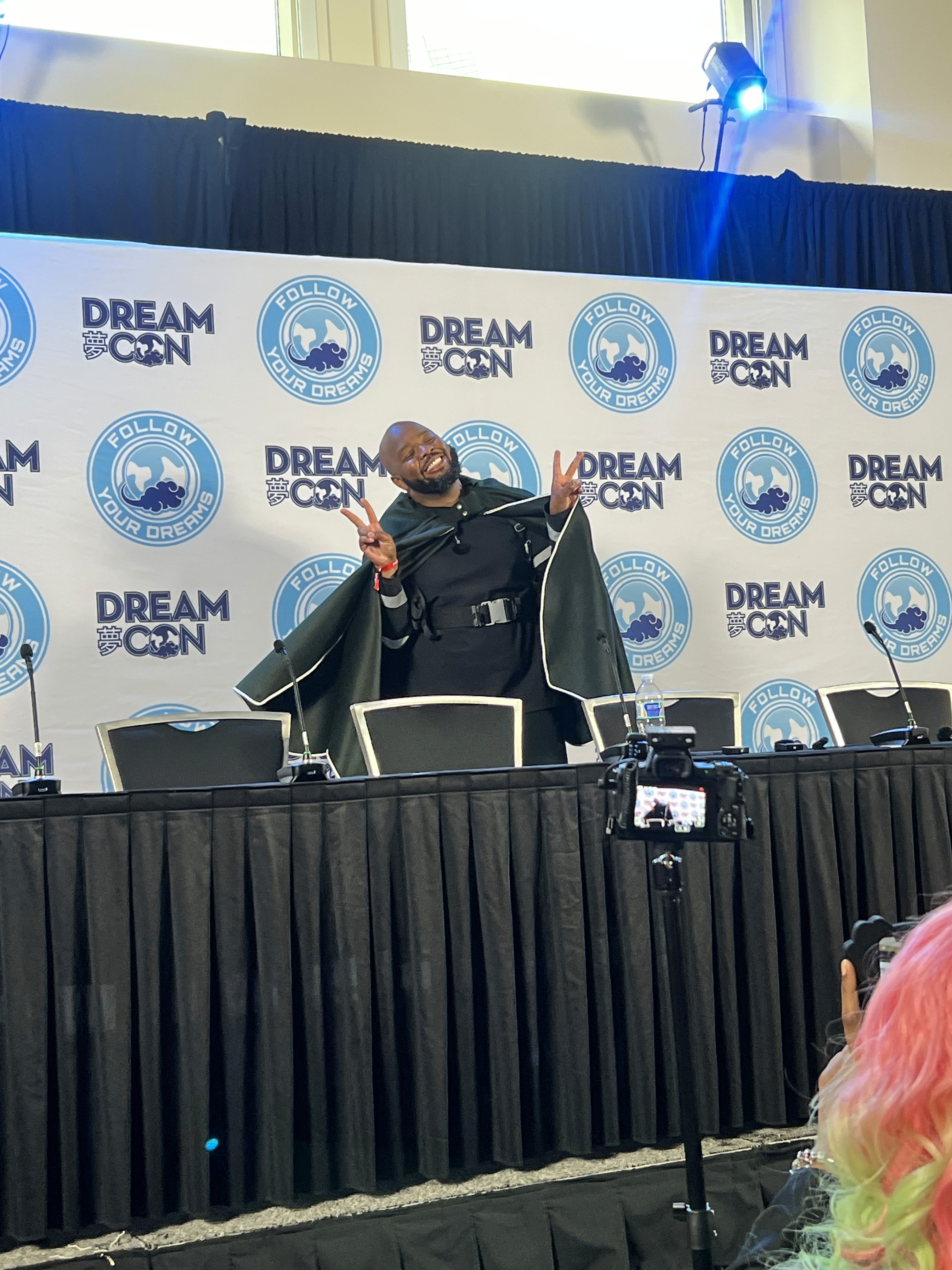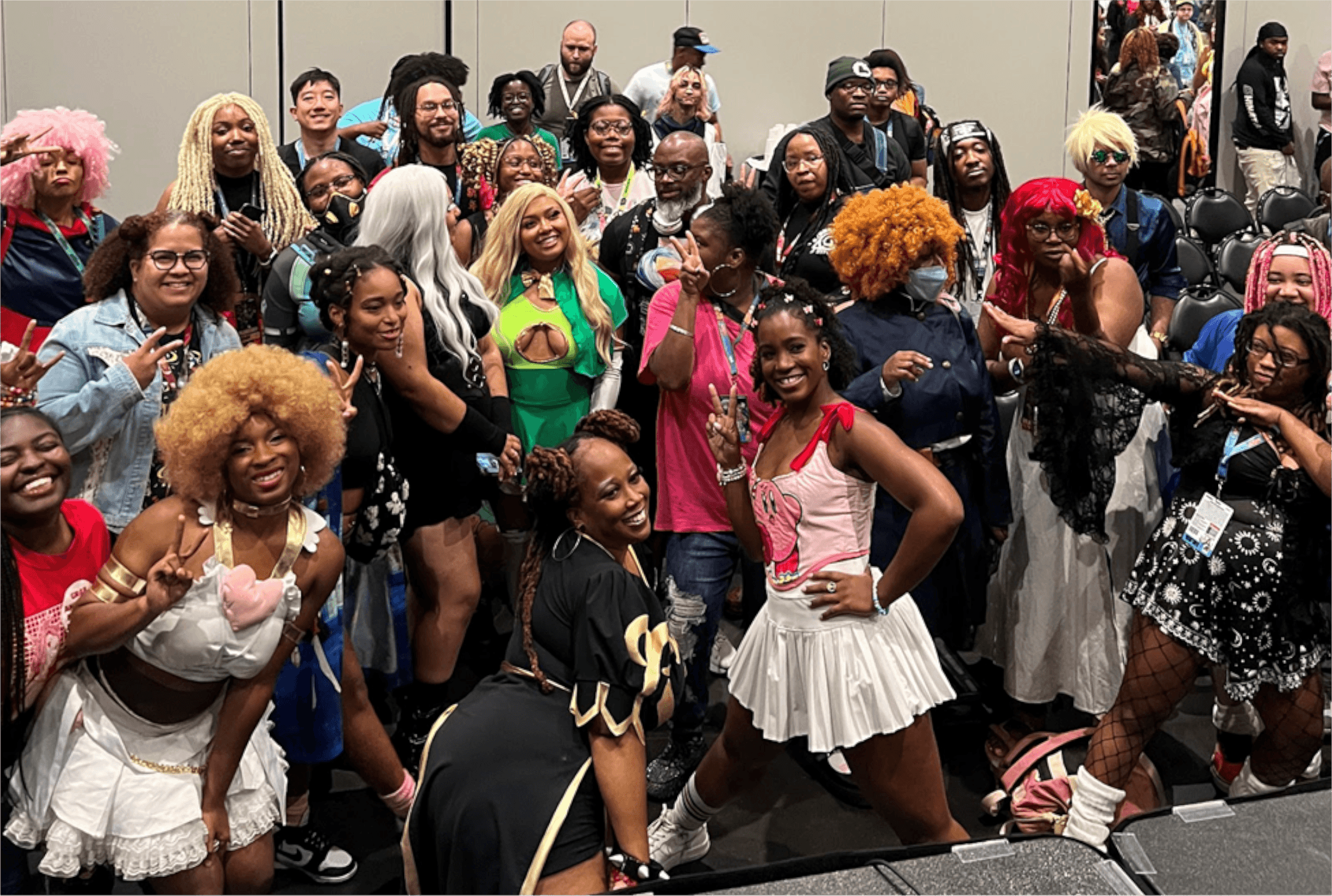During New York Comic-Con 2024, OFF BLXXK had a chance to speak with the creative team behind the upcoming Cartoon Network animated series Iyanu, an adaptation of their original graphic novel. This action-adventure-filled story follows a teenage orphan named Iyanu. She does not remember her past or where she comes from, but later discovers she has powers that rival the gods of the land (based on Nigerian mythology). In partnership with Lion Forge Entertainment, one of the few Black-owned animation studios in North America, the show will air on Cartoon Network and stream on MAX and Showmax (Africa) in Spring 2025.
I sat down with Roye Okupe, Creator, Executive Producer, and Showrunner of Iyanu; Paula Gammon Wilson, Voiceover, Performance, and Casting Director; Darnell Johnson, Episodic Director; and Brandon Easton, Head Writer and Story Editor. We chatted in-depth about Iyanu and what audiences can look forward to. For the full interview with extended answers and more questions, check out our affiliate podcast, Blxxk Anime.
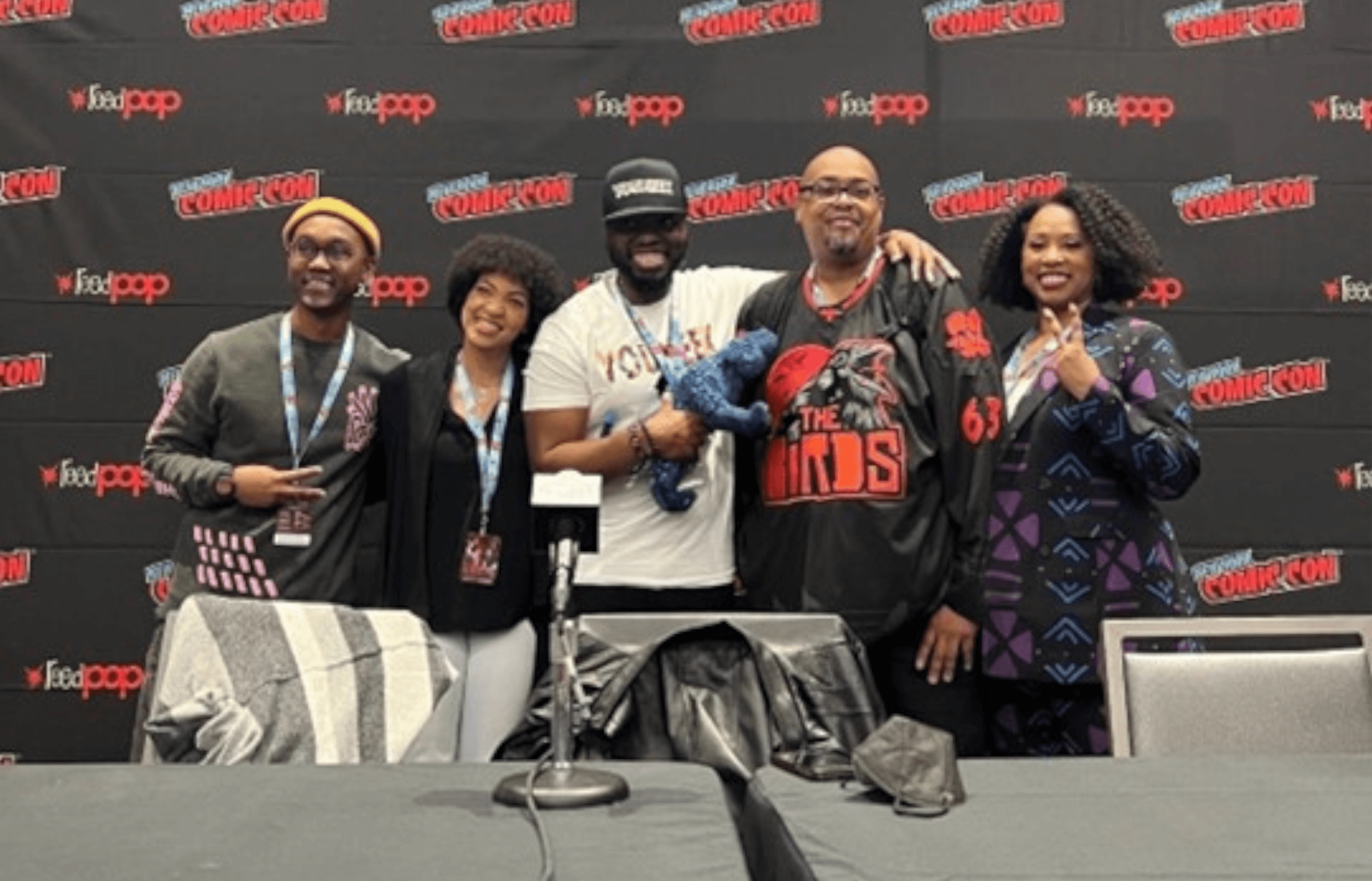
From Left to Right: Roye Okupe, Paula Gammon-Wilson, Darnell Johnson, Brandon Easton, and Karama Horne | Photo by OFF BLXXK
McQueen (OFF BLXXK): I looked up the meaning of “Iyanu” and found the name means “wonder” or “miracle,” and specifically how it’s associated with the lucky number seven. How do these ideas come across in Iyanu, and how do they help the character grow as the story goes on?
Okupe: Names in Yoruba culture are very, very important. Everybody’s name means something, and it’s usually tied to an event or something that your parents either experienced or want to experience. So, the name “Iyanu,” in itself, means “miracle” or “wonder,” and that’s so intertwined into the story—into almost every aspect of the story.
Johnson: The name “Iyanu” just…literally explains what the show is about. I mentioned it on the panel about [how] there’s greatness put in each and every one of us. And I really do believe that, in this series, you’re going to see how Iyanu, who was an orphan, [needs] to figure out who she is. And to unlock that, she has to really seek out different people and invite people into her journey and her life for her to really tap into who she is. She had amnesia and she wasn’t able to figure things out and what took place. [She is] really owning that and stepping into that and who she is to be able to unlock her powers and also to connect with people with empathy to really know how to feel for people and put herself in other people’s shoes.
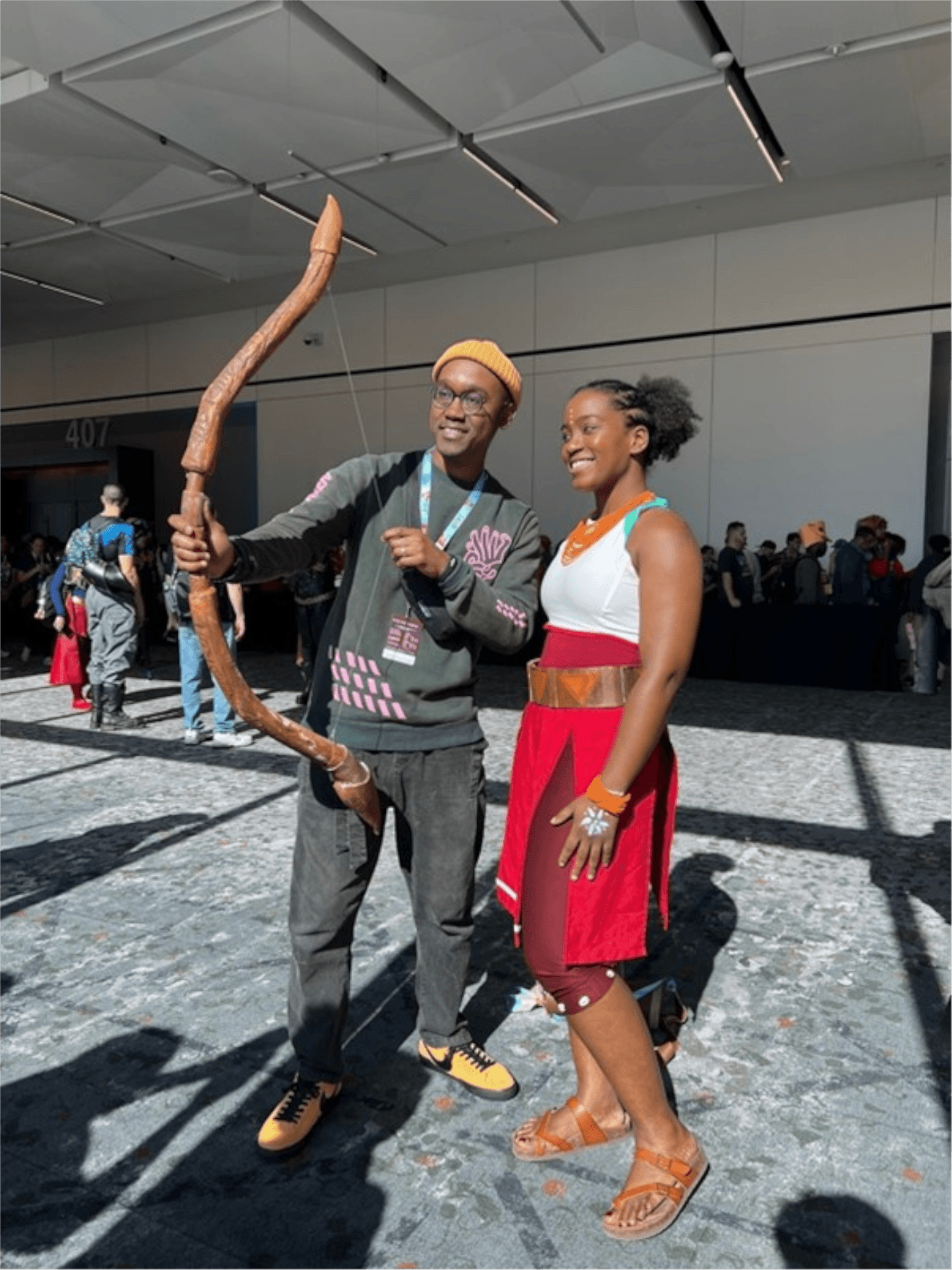
Roy Okupe and VantaCreates | Photo by OFF BLXXK
McQueen (OFF BLXXK): Along those lines of empathy, I loved how you guys talked about it in your panel. How does empathy impact the story? And can you talk a little bit about the connection between human and spirit (or the cultural aspect), and how her empathy between worlds can strengthen her power?
Okupe: There’s a lot of deep things when it comes to African culture, in general. Like, Brandon…I think you mentioned something on the panel—that it “takes a village to raise a child.” There are so many of those sayings that are tied [to] community, fellowship, togetherness…and you can’t have any of those things without empathy. You can’t have a strong community where people don’t look out for each other and recognize each other in a way where [they] see you beyond just the “vanilla” stuff. You have to see someone at a certain depth to understand them, to feel for them—and not to necessarily have pity for them, but to understand what they’re going through or what their issue is.
And I’ll take it a step further: So, culturally, we have that, and in the show, Iyanu’s powers are actually tied to empathy. In order for her to achieve certain things and to have success at the highest level, she has to unlock certain parts of her empathy. And not just for the people that are easy to get along with, [but for] the people she disagrees with.
For me, one of the most fascinating things is that this went beyond the show itself. This [concept] started to seep into how we [the team] started to relate to one another and how we treated one another. I think it’s really a testament to how you can work on a story, and the themes that you’re creating start to seep into how everyone’s working together. This thing is so hard to make, that if you don’t have empathy for the person that you are either passing on the baton to—going from writing to directing, or from writing to voice directing or casting to writing—[then]…it can get ridiculous very quickly.
So…empathy is something that we see a lot of…not just, “Oh yeah, it’s nice in the story.” It’s something that we try to practice with each other as well, too.
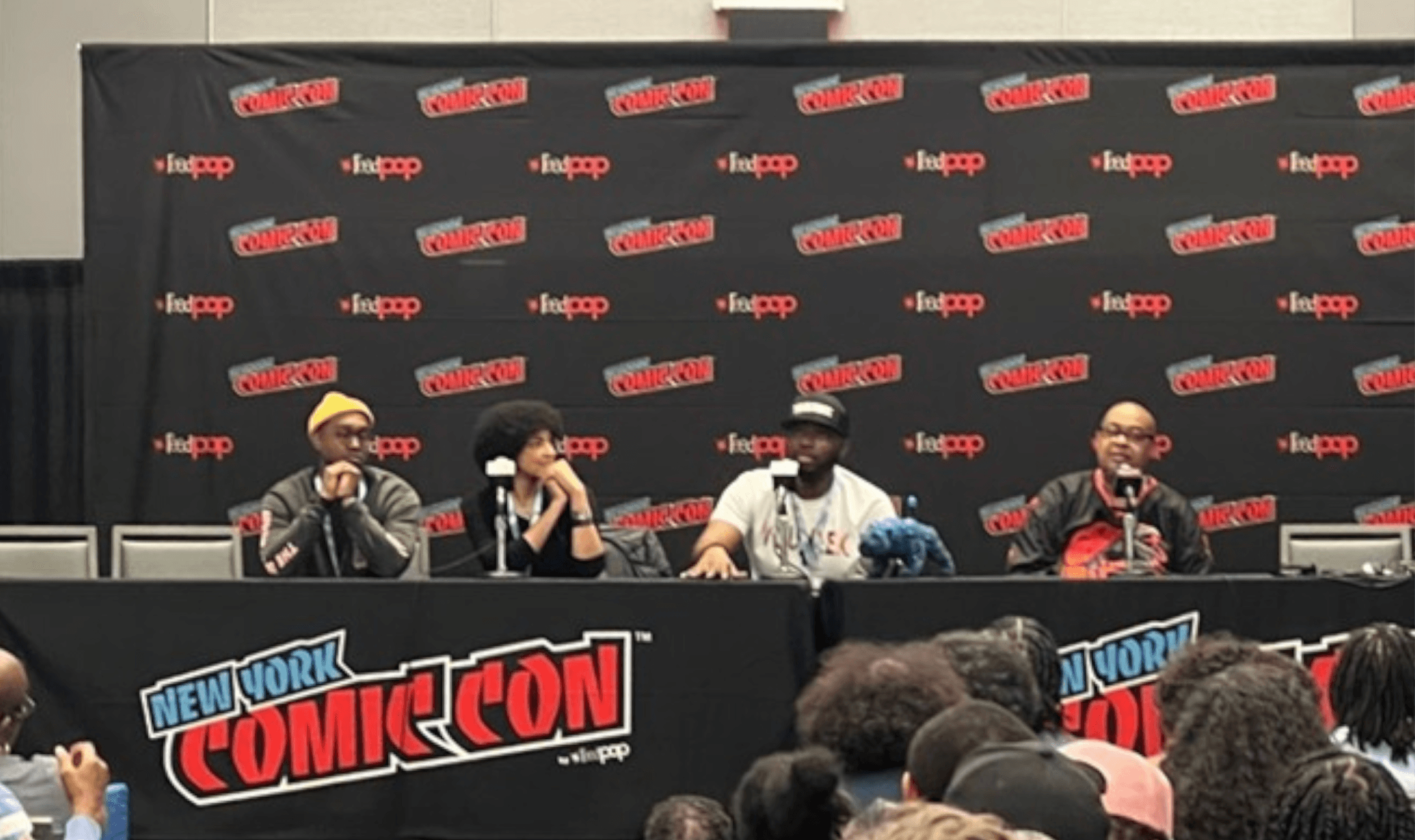
From Left to Right: Roye Okupe, Paula Gammon-Wilson, Darnell Johnson, and Brandon Easton | Photo by OFF BLXXK
McQueen (OFF BLXXK): Paula, as the Voice and Casting Director of the series, how important was it for you to curate an all-Black cast, especially in the industry that we see ourselves in now?
Gammon-Wilson: Incredibly important. I opened my European studio specifically so that I could incubate and develop BIPOC projects, and it was one of the reasons I jumped all over this when Roye was like, “Here you go!” It was also important to me to make sure that Roye's vision for a Nigerian cast was realized, because, too many times, an African cast becomes a sort of Pan-African “nothingness” as opposed to a place or something specific. Like, if you say a show is in Georgia, they will go find actors who have Georgian accents, but they don't do the same for an entire continent. So, it was important to me that I honor that as much as possible. We do have one cast member who is not Nigerian, and that was a deliberate choice—which, hopefully, you'll see.
I get quite frustrated when I'm brought yet another project that is basically a “retread” of Ben 10 [but] “Ben 10 but a horse,” “Ben 10, but a bear.” I get a lot of that. So anytime I have the chance to work on something where the cast has, you know, autistic characters, or African characters, or characters who are immigrants, or anything that allows me to direct the world and not one idea of the world, that’s incredibly, incredibly exciting to me, and it’s much more fulfilling to be [a] part of.
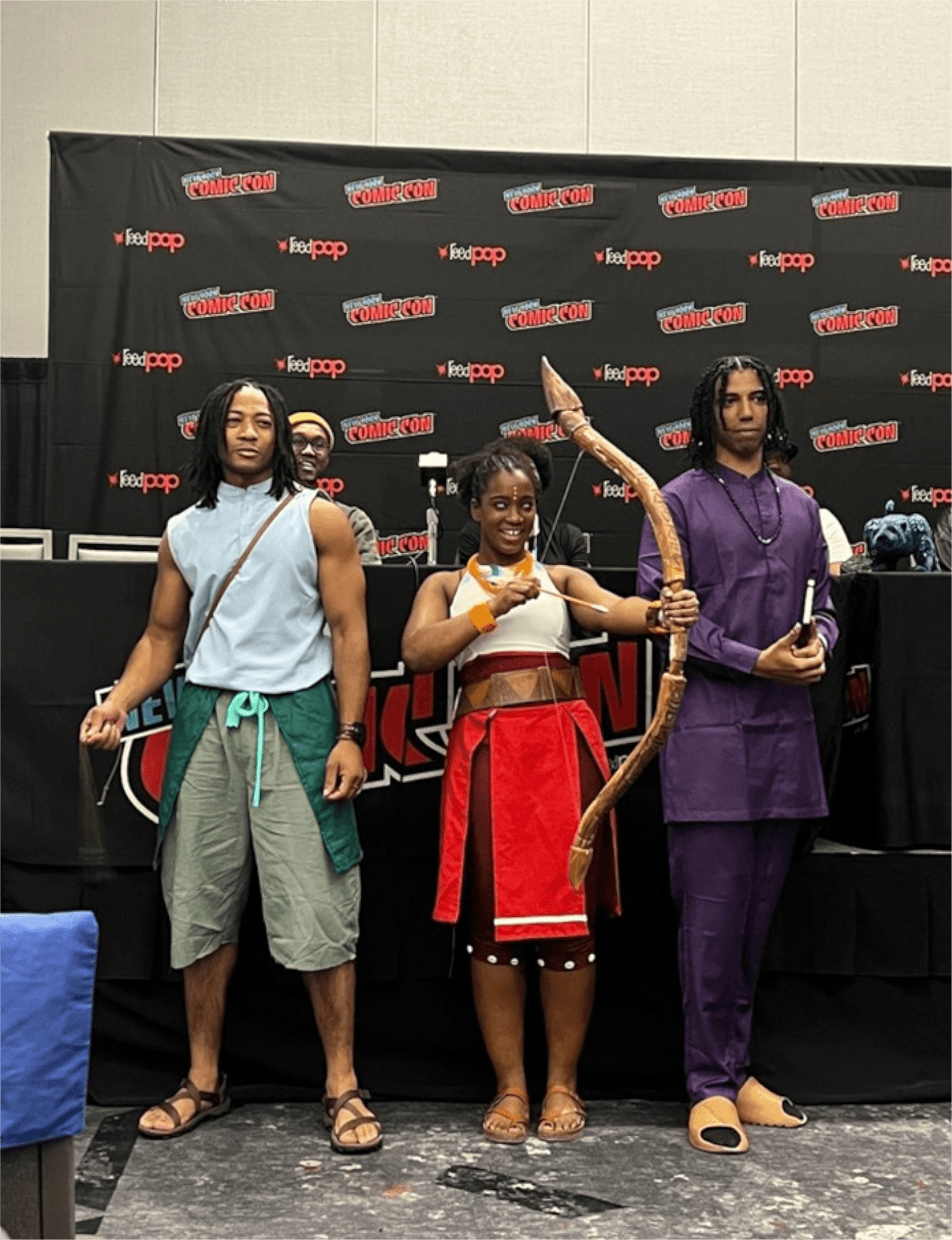
From Left to Right: IcemanHickey, VantaCreates, and Jimmyt2High | Photo by OFF BLXXK
McQueen (OFF BLXXK): What is one thing in this series that you especially wanted to highlight from Yoruba culture? Is there something that became very central to you while working on this project?
Johnson: Food.
Okupe: Oh, yeah, yeah. That's something that we really wanted. We talked about that a lot. I think for me, one of the things that was very important to me was... So, if you look at—maybe not so in the last couple of years, but if you go back five, ten years, most of the stuff that was portrayed about Africa—and I can speak specifically for Nigeria in mainstream media—were a lot of negative things. [There’s] a CNN ad where it's like, “Okay, send money for this kid who is”—and it's not like those things don't exist—those things exist, but it’s part of the tapestry, right? You can't take all the negative parts and then [have] that as the banner [that’s] representing an entire continent.
When I first got to the U.S. back in 2001, I had somebody ask me if I had giraffes living behind my house. This wasn't a joke. This was a serious question that they asked me. And to be honest, I wasn't necessarily upset at that person, but that's what they've been exposed to, right? So, for me, it's about showing a side of Africa—Nigeria specifically. Even though this is a fictional Yoruba, a lot of what is in the show is inspired by real Yoruba culture: from the food to the clothing, the way people talk, the way people act, the slang—all of these things, even things that are so culturally specific to African culture, like resilience.
These are all things that I want people to see—a different side of African culture—and to be able to appreciate the beauty and see some of the things that, yes, we do struggle with. Some of the struggles you would see in Nigerian culture—for instance, the class system—are represented in the story, right? But it's not the main part of the story. It's part of the tapestry. So, it’s giving people a broad view of what my culture looks like and giving them a chance to appreciate it in its full—as opposed to taking one section of the negativity and making that the “banner” of what people think Africans look like and feel like.
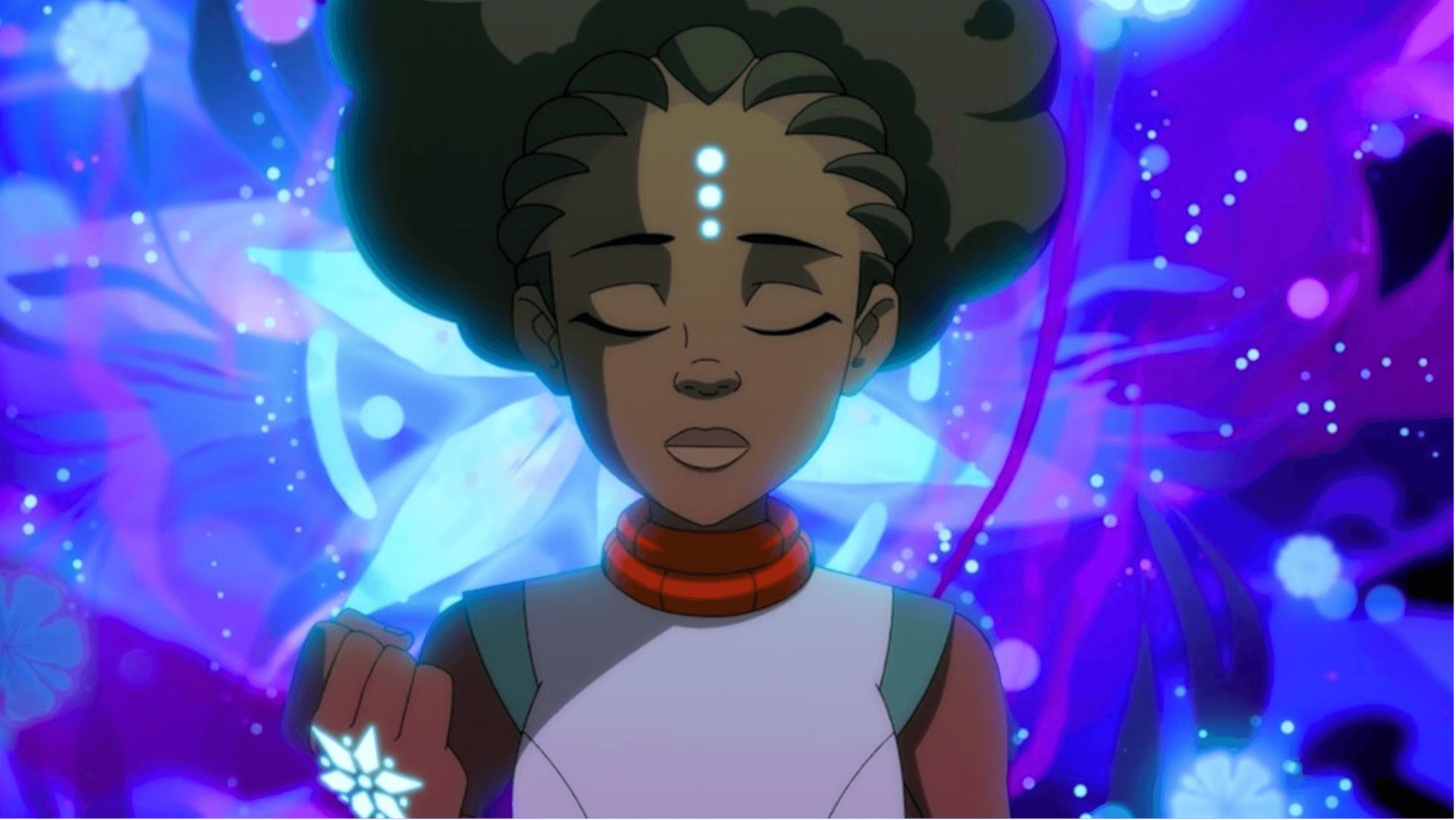
McQueen (OFF BLXXK): Last question: What is Iyanu, specifically to you?
Gammon-Wilson: It was a chance to direct the show that I wished I'd had when I was a kid. It was a chance to give a voice to a character that came to mean more and more to me across the process as the character grew, because…this journey is a very honest one and a very realistic one. It was wonderful getting the chance to direct that journey of a character that I, my 14-year-old self, would have adored.
Okupe: I mean, I think for me, the obvious answer: Iyanu is a dream come true. But it's not just in the way people think. Like, okay…to go from having a graphic novel to then…creating an animated series that's going to be on a major broadcasting network… It’s literally one in a million, right? There's a lot of hard work involved, but it's also a lot of luck. And then…for people like us…doors are locked for us. You have to break down walls to get in, and breaking down a wall is hard. So, for me, this represents a dream come true. But one of the most important things to me about this dream coming true is [that] this is my first time being an executive producer and showrunner. It was also my first time writing for an animated TV series.
And I’ve said this before, I said it on the panel: Brandon Easton taught me how to write for TV. I would take his scripts home after the writer’s room and just read them over and over again. Paula taught me how to voice direct. Like, I hadn't done any of these things before. I always knew I had the talent, but I never had the opportunity and the mentorship for people to be able to put me in a position where I could express myself with all the gifts that I knew that I had inside. So, one of the things I feel very fortunate about is being surrounded by people who are excellent at their jobs, being able to learn from them, and having the grace that they've given me as a creator to be able to [do so].
This vision is very complex. It's very deep. It's very rooted. It's rooted deeply in cultural elements that are hard for people to grasp if you weren't born and raised in a place where I was. So, people are coming in not just on a technical level, but there's so much you have to learn about Yoruba culture to even just exist on this project. So, you know, from Brandon…Paula…Vincent Edwards, our Supervising Director—even people like Darnell, who came from Spider-Verse. There's a lot that I learned from [Darnell] before I directed my episodes. I feel like the luckiest person in the world, being able to be surrounded by…people that actually want you to succeed. It's not about, oh, “I want to shine here.” These people actually put the project first, and it's not always like that for these types of shows.
Johnson: Yeah, Iyanu, to me, would have to be…what I want to be as a storyteller. I think it's going to bring wonder and hope, to a world where…everybody's looking out for themselves and have their own agendas. So, like, in Iyanu, there's an episode that's about forgiveness. You don’t even have that on a lot of shows that are airing. To even touch a theme or a subject like that [is] pretty powerful. And it's going to really pull on a lot of people's emotional strings and really do some healing. So that’s what I’m looking forward to. The show is going to do a lot of healing. And then with the generation that's going grow up with this, it's going to hopefully make the world a better place and encourage the next generation to really look out for each other and be there for each other.
Easton: I mean, I would say everything everybody here said. I mean, everything everybody in here said really echoes how I feel in my heart and on a deeply personal level. I've spoken to Roye endlessly about this: This show came into my life at a period of intense personal challenge in the sense that Hollywood is not kind to Black people, and especially Black men, trust me. I had hit a wall—an obstacle that I didn't think I was going to get over until this opportunity came along. And this was my first and maybe even last shot at glory. And I don't say that in a hyperbolic way. I really felt like I had to do everything I could.
This was my first time running a writer’s room, and I had some really good people, including Roye, but Carrie Grant, Ivory Floyd, Matt Wayne—that was our Season One writing team. And then we had some really good producers and everybody and—we just had a good team. Despite every crazy challenge we had in the room, every challenge we overcame made us a better writer, a better writer’s room, and a better team, and a better production unit.
I learned some things from all the directors. They flew me out to St. Louis to explain some things to me personally and in a good way. I can just say this was one of the greatest opportunities I've ever had in my life. I just hope that the world really appreciates what we all—all our sacrifices and blood, sweat, and tears—and I'm really praying that people give it a fair shot.
Conclusion
According to Okupe, “If you love shows like Avatar, the Last Airbender, Dragon Prince, Legend of Korra, and even some anime like Fullmetal Alchemist, you would really love Iyanu as well.” Iyanu is set to premiere on Cartoon Network and Max in Spring 2025. To keep up with Iyanu updates, check out the website and subscribe to its newsletter, or jump on its Instagram page. You can also find the official trailer for Iyanu on Cartoon Network’s YouTube channel. For the full interview with extended answers and more questions, check out our affiliate podcast, Blxxk Anime.


